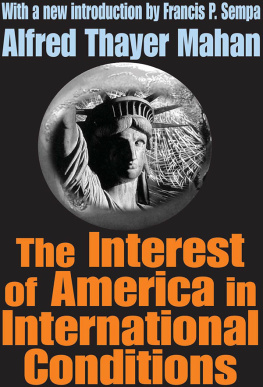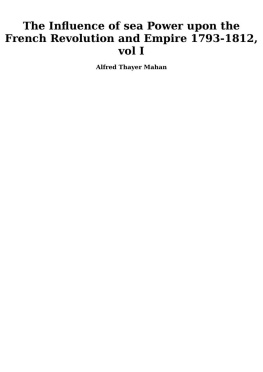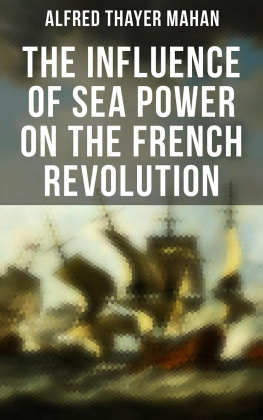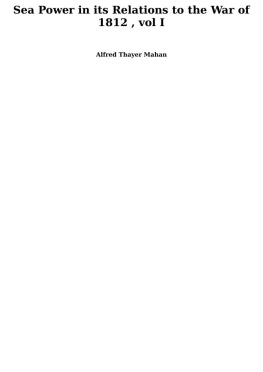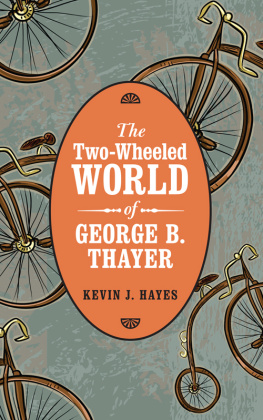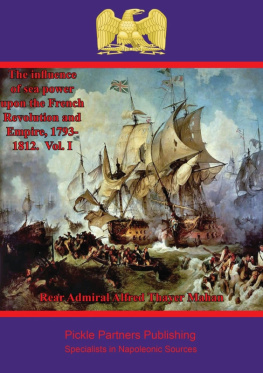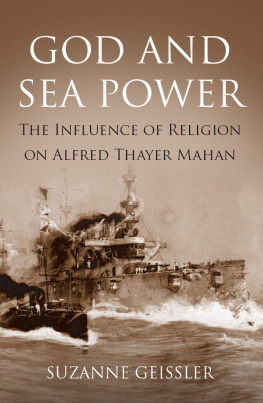Originally published in 1915 by Little, Brown, and Company
Published 2003 by Transaction Publishers
Published 2017 by Routledge
2 Park Square, Milton Park, Abingdon, Oxon OX14 4RN
711 Third Avenue, New York, NY 10017, USA
Routledge is an imprint of the Taylor & Francis Group, an informa business
New material this edition Copyright 2003 by Taylor & Francis.
All rights reserved. No part of this book may be reprinted or reproduced or utilised in any form or by any electronic, mechanical, or other means, now known or hereafter invented, including photocopying and recording, or in any information storage or retrieval system, without permission in writing from the publishers.
Notice:
Product or corporate names may be trademarks or registered trademarks, and are used only for identification and explanation without intent to infringe.
Library of Congress Catalog Number: 2002041613
Library of Congress Cataloging-in-Publication Data
Mahan, A. T. (Alfred Thayer), 1840-1914.
The interest of America in international conditions / Alfred Thayer
Mahan ; with a new introduction by Francis P. Sempa.
p. cm.
Originally published: Boston : Little, Brown, and Co., 1915.
Includes bibliographical references and index.
ISBN 978-0-7658-0525-6 (paper : acid-free paper)
1. International relations. 2. United StatesForeign relations1913-1921. 3. EuropeForeign relations1871-1918. 4. World politics 1900-1918. 5. Geopolitics. 6. Balance of power. I. Title.
JZ1242.M34 2003
327.73dc21
2002041613
ISBN 13: 978-0-7658-0525-6 (pbk)
Alfred Thayer Mahan was born in 1840 into a world where international politics were dominated by the Concert of Europe, an international system that was constructed by the great powers in the aftermath of the Napoleonic Wars. Mahan died seventy-four years later in December 1914, five months after that international system was shattered forever by the beginning of the cataclysmic First World War. It was Mahans appreciation of the coming collapse of the Concert of Europe that led him to write his 1910 classic, The Interest of America in International Conditions.
Mahan was born on the campus of the United States Military Academy at West Point, where his father, Dennis Hart Mahan, was a professor. Dennis Mahan, an intellectual disciple of the brilliant Swiss strategist Jomini, taught many of the men who became generals on both sides during the Civil War. Mahans mother, Mary Okill Mahan, was a devout Christian who reared all of her children with religious discipline. Against his fathers wishes, Alfred entered the United States Naval Academy at Annapolis in 1856. Prior to entering the Naval Academy, Mahan attended Columbia College in New York, where he resided with his uncle, Milo Mahan, a theology professor and author who had a profound influence on Mahans intellectual development.
After graduating from Annapolis, Mahan served in the Union Navy during the Civil War, mostly on ships that performed blockade duty. After the war, Mahan served aboard six different ships during which he saw much of the world, saw duty at the Navy Yards in Washington, Boston, and New York, and was assigned to duties at the Naval Academy.
In 1885, two years after he wrote his first book, The Gulf and Inland Waters, a description of naval engagements in and around the Gulf of Mexico during the Civil War, Mahan joined the faculty of the Naval War College in Newport, Rhode Island. He had been a dutiful, if reluctant, seaman since the end of the Civil War. At the Naval War College, however, Mahan thrived, eventually becoming the president of the college, a respected lecturer, and a world-renowned writer, historian, and philosopher of sea power and empire.
Mahan achieved worldwide fame in 1890 with the publication of his second book, The Influence of Sea Power upon History 1660-1783. The books first chapter on the elements of sea power became must reading by the navies of the worlds great powers. Mahan wrote two two-volume sequels to this work: The Influence of Sea Power upon the French Revolution and Empire (1893) and Sea Power in its Relation to the War of 1812 (1905). It is mainly for these naval histories and lesser historical works that Mahan was most celebrated, and is most remembered.
Mahans naval career also included service on the Naval War Board during the Spanish-American War, participation as a delegate to the Hague Peace Conference, and, ironically, in light of his frequently expressed admiration for the British Empire, helping the navy to draft plans for a possible war against Great Britain. Mahan also advised congressmen, senators, cabinet members, and presidents, including Theodore Roosevelt, on naval policy and international affairs.
In his intellectual life, Mahan, however, was more than just a great naval historian. He was also a keen observer of contemporary international events and one of the worlds most important geopolitical thinkers. Between 1890 and 1914, Mahan wrote numerous essays and several books on contemporary international relations. He wrote at a time when the stability of the international system established at the Congress of Vienna was being seriously and dangerously challenged by Germanys bid to add strong sea power to her already burgeoning land power in Europe.
The German Empire had been forged in the 1860s and early 1870s by the skillful diplomacy of Otto von Bismarck and Prussian military power. After achieving German unification in 1871, however, Bismarck devoted his diplomatic energies to promoting German interests within a stable European balance of power. Unfortunately for the world, Kaiser Wilhelm II, who had grander visions for Germany, removed Bismarck from power in the early 1890s and embarked on a naval program that directly challenged Great Britains supremacy at sea.
Meanwhile in Asia, growing Russian power threatened central Europe, the Middle East, and East Asia. Americas victory in the Spanish-American War in 1898 had extended U.S. interests to Asia and the Pacific. By 1900, the United States was a continental-sized giant with an overseas empire, but it lacked sufficient naval power to adequately protect those interests. Mahan, once a self-proclaimed isolationist, now became the countrys leading intellectual proponent of an expanding American Empire.
* * *
In the decade of the 1890s, the now celebrated naval historian undertook to explain the geopolitical position of the United States in the world. Mahans sea power books contained general principles of warfare applicable to all naval powers, including the United States, but the books focus clearly was Great Britain. When Mahans writing shifted to contemporary world events, his principal concern was his own country. The former isolationist now became the countrys leading intellectual imperialist and its leading analyst of the global balance of power.
Mahan viewed the world through the geopolitical prism of his first two sea power books. In The Influence of Sea Power upon History 1660-1783 and The Influence of Sea Power upon the French Revolution and Empire, Mahan described a four-century struggle between continental land powers and insular sea powers for political control of Europe and its adjacent seas. First it was the Austrian and Spanish Hapsburgs in the sixteenth century who possessed great overwhelming power which all others feared.
Of these three attempts at continental hegemony, Napoleons was the most threatening and successful. France under Bonaparte controlled by conquest or alliance most of the European Continent and tried to close all continental ports to British ships. Napoleons intention, wrote Mahan, was to seize the navies of Europe and combine them in a direct assault upon [British] maritime power. Napoleons success, however, stopped at the waters edge. In Mahans memorable description:

